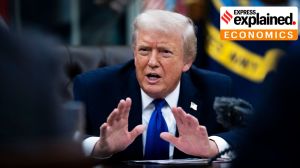In what highlights India8217;s growing clout in the global arena, the emergency Summit on Financial Markets and the World Economy hosted by US President George Bush on Saturday addressed each of its three key concerns8212;higher fund flows from the World Bank, larger say in the International Monetary Fund and a shield against the protectionist tendencies of the developed world.
The draft declaration of the Summit said developing economies including India must have greater voice and representation in the IMF. India, at present, has a miniscule quota of 1.29 per cent or 6 billion in the IMF, hardly representative of the over 1-trillion size of its economy.

Prime Minister Manmohan Singh, who spoke at the Plenary Session of the G20 leaders Summit, also extracted a promise to include India in the Financial Stability Forum8212;an exclusive G7 club now8212;that8217;s entrusted with surveillance and supervision of global financial markets. In fact, the G20 Finance Ministers had, in their preparatory meeting at Sao Paulo, Brazil, agreed in-principle to expand the FSF membership.
The immediate and more important demand of India was to impress upon the World Bank to significantly hike its resource flow from 3 billion. The Bank has now agreed to open a separate 9 billion window for infrastructure funding8212;in addition to its annual commitment8212;to India over the next three years. Recognising that developing countries were not the cause of this crisis, the Summit declared IMF and the Bank would provide them liquidity facilities and development funds, respectively.
Earlier in his address, Singh said the developed countries must forestall any protectionist tendencies that surface in times of recession. He also pushed for a successful conclusion of global trade talks. Hectic back-room negotiations were simultaneously on between Commerce Secretary G.K. Pillai and US Trade Department officials to resolve pending differences and help complete the Doha round by December.
The Summit declaration surprisingly said the G20 must refrain from raising new barriers to investment or to trade in goods and services, imposing new export restrictions, or implementing WTO-inconsistent measures to stimulate exports. These would help India in growing its exports moderately despite a shrinking global market.
Finally, the Summit agreed on a timeline of March 31, 2009 to enhance guidelines for valuation of securities and disclosure of complex financial instruments that triggered the global crisis at first place. It also said the IMF and the expanded FSF must develop recommendations on executive compensation and leverage that were largely responsible in exacerbating the crisis.
RBI8217;s new economic boost
For housing
Story continues below this ad
8226; Provisioning requirements for standard assets cut to a uniform level of 0.40, lowering cost of funds for banks
8226; Claims secured by commercial real estate to attract uniform risk weight of 100 as against risk weight of 150
8226; Housing finance companies allowed to raise short-term foreign currency borrowings
For India Inc.
8226; Unrated claims on corporates to attract uniform risk weight of 100
Story continues below this ad
8226; RBI to consider proposals from Indian companies to prematurely buy back their FCCBs
For exporters
8226; Period of entitlement of first slab of pre-shipment rupee export credit extended
8226; Export credit refinancing facility for scheduled banks extended to 50 per cent from 15 per cent
For NRIs
8226; Interest rates on FCNR and NRE RA deposit schemes hiked.

































